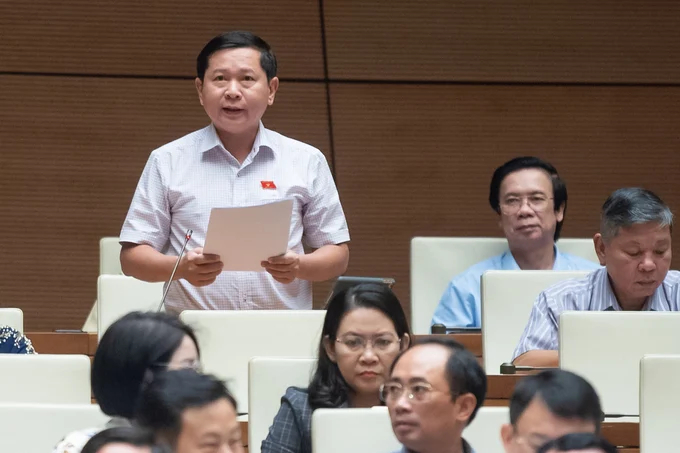May 21, 2025 | 05:47 GMT +7
May 21, 2025 | 05:47 GMT +7
Hotline: 0913.378.918
May 21, 2025 | 05:47 GMT +7
Hotline: 0913.378.918

Delegate Ta Minh Tam (Tien Giang) gave opinions related to the agricultural sector.
During the discussion session on socio-economic development issues at the National Assembly on the morning of November 1, delegate Ta Minh Tam (Tien Giang) gave opinions related to the agriculture industry. According to him, despite many difficulties and challenges, after more than 2 years of implementation, the plan to restructure the agricultural sector has brought positive results.
In addition, the legal framework to facilitate the process of restructuring the agricultural sector has received new attention and promulgation. The agriculture sector continues to play an important role in creating jobs, reducing poverty, creating stability, and contributing to the socio-economic development of the country.
However, the delegate said that the progress of implementing several programs, tasks and projects in restructuring the agriculture sector is still slow. The results of economic structural innovation and conversion of agricultural production models are still sluggish, and agricultural production efficiency is uneven.
"The basic bottlenecks of the agricultural sector have not been resolved, and the risks and issues relating to trade have not been completely handled. Implementation of set targets in agricultural development is still problematic, unable to attract many businesses to invest in agriculture", the representative of Tien Giang province expressed his opinion.
On that basis, delegate Ta Minh Tam made 5 proposals to the National Assembly and the Government to attract investment and create breakthroughs for the agriculture industry in the coming time. The first is to review, evaluate and improve mechanisms and policies to promote the restructuring of agricultural production and business to attract investment, increase interest in the industry and invest in infrastructure to overcome problems and hardships.
Second, accelerate the work of implementing the plan to restructure the economy for the period 2021-2025 in the agricultural sector according to Resolution No. 31 along with programs, projects, and schemes according to Decision 255 of the Prime Minister.
Third, effectively integrate the contents of agricultural restructuring and new rural construction in both mechanism building and administration. Organize and implement these two major contents, focus on developing agricultural production, developing links with the value chain, investing in logistics trade infrastructure and paying attention to effective integration. This will serve to promote the synergy of investment resources for these two important contents.
Fourth, issue policies as soon as possible to support collective economic development in the direction of letting collective economic organizations be the subjects. Combining the State's investment and investment and management from collectives and people. There are effective mechanisms to promote and strengthen links between collective economic organizations and other economic sectors, especially state-owned enterprises.
Fifth, strengthen monitoring, and evaluation, and improve efficiency and effectiveness in implementing requirements, content, tasks, goals, and targets to restructure the agriculture sector.
From there, This serves as a basis for adjusting and perfecting policies, improving and promoting the effectiveness of monitoring and evaluation criteria, and serving the restructure of the agriculture sector in the period 2021 - 2025.
Translated by Hoang Duy

(VAN) In 2024, over 295 million people across 53 countries and territories faced acute hunger—an increase of almost 14 million people compared to 2023, while the number of people facing catastrophic levels of hunger reached a record high.

(VAN) World Environment Day 2025 (June 5) carries the theme 'Beat Plastic Pollution' continuing to emphasize the global urgency of addressing the plastic waste crisis.

(VAN) This was the assessment shared by experts at the workshop titled 'Assessing the Role and Potential of Low-Emission Rice Production Systems in Vietnam,' held on the morning of May 19.

(VAN) Cai Rong Port is the fisheries control center of Quang Ninh, helping to monitor fishing vessels, combat IUU fishing, and remove the EC's 'yellow card'.

(VAN) The German Agricultural Society (DLG) explores the possibility of establishing a mechanization service center in Vietnam’s Mekong Delta to support farmers in accessing and utilizing advanced machinery.

(VAN) On May 16, the Department of Water Resources Management, in collaboration with the Food and Agriculture Organization of the United Nations (FAO), held a signing ceremony for the GEF-8 project document.

(VAN) Food safety, mechanization, vocational training, and market opening are key areas of cooperation expected between the Vietnamese Government and the Federal Republic of Germany.